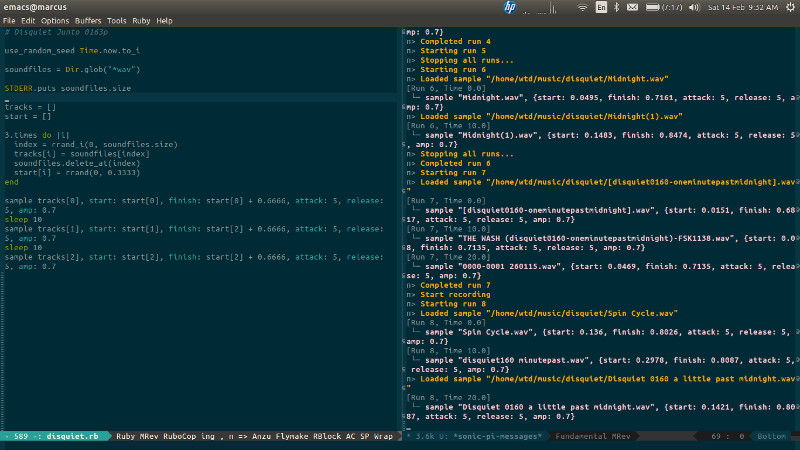I follow Marc Weidenbaum’s collaborative musical project the Disquiet Junto to see what the projects are, and sometimes listen to the work people create. I’ve never contributed before, but the current project, Disquiet Junto Project 0163: Layering Minutes After Midnight, was something I could tackle easily with Sonic Pi, so I had a go.
The instructions for this project are:
Step 1: Revisit project #0160 from January 22, 2015, in which field recordings were made of the sound one minute past midnight:
Step 2: Locate segments that are especially quiet and meditative — and confirm that they are available for creative reuse. Many should have a Creative Commons license stating such, and if you’re not sure just check with the responsible Junto participant.
Step 3: Using segments from three different tracks from the January 22 project, create a new work of sound that layers the pre-existing material into something new, something nocturnal. Keep the length of your final piece to one minute
Step 4: Upload the finished track to the Disquiet Junto group on SoundCloud.
Step 5: Be sure to include link/mentions regarding the source tracks.
Step 6: Then listen to and comment on tracks uploaded by your fellow Disquiet Junto participants.
What I did was this. First, I downloaded all of the downloadable WAV files in the project. (Sonic Pi can only sample them and FLAC, and for some reason the FLAC file I got didn’t work.)
Next I wrote a script that would choose three different WAV files at random and for each one a random starting time within the first 20 seconds of the track. (Assuming all tracks are exactly 60 seconds, this means choosing a random number between 0 and 1/3, because for Sonic Pi the start of a sample is at 0 and the end is at 1.)
use_random_seed Time.now.to_i
soundfiles = Dir.glob("*wav")
STDERR.puts soundfiles.size
tracks = []
start = []
3.times do |i|
index = rrand_i(0, soundfiles.size)
tracks[i] = soundfiles[index]
soundfiles.delete_at(index)
start[i] = rrand(0, 0.3333)
end
sample tracks[0], start: start[0], finish: start[0] + 0.6666, attack: 5, release: 5, amp: 0.7
sleep 10
sample tracks[1], start: start[1], finish: start[2] + 0.6666, attack: 5, release: 5, amp: 0.7
sleep 10
sample tracks[2], start: start[2], finish: start[2] + 0.6666, attack: 5, release: 5, amp: 0.7 </a>
</a>
It plays the fragment of the first track, then 10 seconds later starts the fragment of the second track, then 10 seconds later starts the fragment of the third track. Since each is 40 seconds long, for 20 seconds all three are on top of each other, then the first ends, then the second, and for the last 10 seconds only the third track is playing. The attack and release settings mean each track takes 5 seconds to fade in and 5 seconds to fade out.
I was doing all this in Emacs if interested) in sonic-pi-mode. After some testing I ran M-x sonic-pi-start-recording, ran the script, then ran M-x sonic-pi-stop-recording and saved the file.
These are the three tracks it chose:
- Spin Cycle-disquiet160-oneminutepastmidnight by High Tunnels
- archway road midnight (disquiet160-oneminutepastmidnight) by Zedkah
- Can you hear the boredom? (Disquiet0160-Oneminutepastmidnight) by moduS ponY.
All have Creative Commons licenses, which I checked before going further.
The result was 72 seconds long (a few seconds were added while I ran the start/stop but I don’t see how that added up to 12) so I used Audacity to change the length to 60s without changing the pitch. I went back later to edit out the start/stop dead time but accidentally overwrote my original file, so I left it as is.
The result is “Waves Upon Waves” (embedded from SoundCloud):
 Miskatonic University Press
Miskatonic University Press